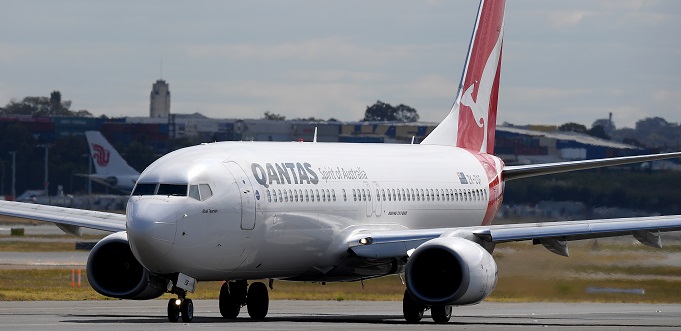
Source: AAP/Dan Himbrechts.
A night spent on a cold, hard terminal floor in Dallas wasn’t a part of the trip to Sydney that 300 Qantas passengers expected.
Frustrated, they tweeted: “There was a mechanical fault with the plane which of course needs to be addressed (!!) but there is apparently *no other plane* and *no other flights* and *no update*.” Then, continuing with a “word of warning”, they claimed Qantas “isn’t what it used to be”.
These days theses tweeters are not alone. Stories of Qantas’ broken promises abound from stranded passengers, cancelled flights, lost luggage and impossibly long check-in queues. And a dispirited Phillip Adams, who coined the line ‘Spirit of Australia’, wants his tagline back.
Alan Joyce. You force to repeat myself. I’m the author of ‘the spirit of Australia’.Then deserved, now tragically inappropriate. My slogan is hereby vetoed. Please remove it from all fuselages, tickets and advertising.
— Phillip Adams (@PhillipAdams_1) June 23, 2022
It feels like something more is happening than regular operating glitches and a challenging environment.
Values and promises
Any organisation’s brand is simply the store of value accumulated or eroded via its promises. As a result, repeated and systemic problems are usually traced back to making the wrong ones, with kept promises connecting to the purpose and values — aka ‘how we do the right things’.
Outlined in the Qantas Group overview of business practices, the company’s values are listed as: Together; Genuine; Inventive; Optimistic, and Experienced. These values are stated as supporting “the vision ‘to be a great airline that champion’s the Spirit of Australia”.
Indeed, sticking together, inventiveness and optimism were all required by those 300 stranded passengers. Although I suspect that’s not what Qantas had in mind.
Getting the small stuff right consistently, one kept promise at a time, is what achieves the kind of stored value that helps an organisation rebound in tough times. And the failure of those basics has landed Qantas as fodder for news and social media.
How did one of Australia’s most beloved organisations become people’s favourite piñata?
A traded reputation
Let’s start with the decisions made by executives and the board that have strip-mined capability and resources, particularly over the past 15 years. Trading reputation, out-sourcing areas vital to performance, and cutting staff for a bump to the bottom line. It’s little wonder there’s no one around to help when things go wrong.
An unsuccessful 2007 private equity buyout would have seen majority ownership move overseas. And from then on, the current decline accelerated. However, the failed bid was more than a canary in the brand coal mine. It signalled those entrusted with the flying kangaroo were willing to trade the ‘Spirit of Australia’ to the highest bidder.
Another cornerstone of Qantas value has long been an unmatched safety record. It even earned a mention in the Dustin Hoffman and Tom Cruise movie Rainman.
It was unmatched until years of out-sourcing maintenance came home to roost, and the airline again lost the vaunted number one spot on the Airline Ratings survey of safest airlines — not even making the top five due to a “slight increase in incidents coupled with the fleet age”.
CEO Alan Joyce’s combative relationship with employees and unions is an overarching driver of the eroding value. Crikey journalist Bernard Keane captures the rot: “The abiding theme of Joyce’s management of the decline of Qantas is his passionate loathing of his workforce. This is the man who shut the entire airline down in 2011 rather than deal with engineers, pilots and transport workers and their unions, who used the pandemic to sack 6000 workers, on top of another 7000 workers also sacked under Joyce.”
No organisation can reliably add value when the relationship between leadership and others tasked with doing the work is profoundly broken. That disfunction quickly loops into the broken promises experienced by customers, suppliers and other partners, depleting goodwill reserves and making every part of the business more costly to operate.
Qantas has long plucked the heartstrings of homesick travellers, claiming a special relationship with Australians and crooning “I still call Australia home” at every opportunity. But unfortunately, that relationship today is mostly a myth. Living in sepia-tone memories. And long-traded for other interests.
Handpicked for you

Qantas tagline author tells CEO to remove it from all branding, as airline battles multiple PR crises



COMMENTS
SmartCompany is committed to hosting lively discussions. Help us keep the conversation useful, interesting and welcoming. We aim to publish comments quickly in the interest of promoting robust conversation, but we’re a small team and we deploy filters to protect against legal risk. Occasionally your comment may be held up while it is being reviewed, but we’re working as fast as we can to keep the conversation rolling.
The SmartCompany comment section is members-only content. Please subscribe to leave a comment.
The SmartCompany comment section is members-only content. Please login to leave a comment.